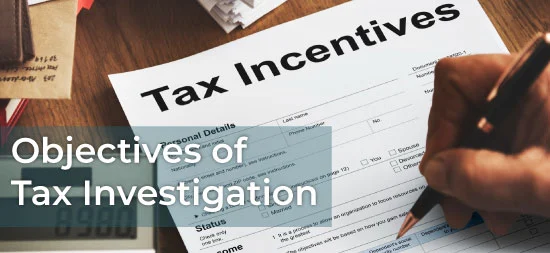
Although It’s a Federal Crime to Charge Illegal Tax, Our Financial Asset Specialist Can Recover Your Lost Assets From Scammers Involved.


Taxes are levied on every product by the state, and since each state has different rules and regulations, these taxes vary. Food served in a restaurant is also taxed. There are taxes on income too, called the income tax. Thus, the state levies taxes, and defaulting on these taxes is a federal crime. Filling in inaccurate details regarding one’s wealth can land that person in prison, charge a heavy fine, or both.
Tax fraud is an act of crime where an individual misrepresents the actual valuation of their wealth in order to pay a lower tax. Avoiding paying the taxes is also a federal crime
Tax Investigation is a special financial team dealing with anti-fraudulent activities. Its primary focus is targeting financial criminal investigations through searching and auditing measures.
The Tax Investigation Team’s objectives are as follows:


Filing taxes early helps to avoid the risk of potential identity theft. It cannot be determined if some have fallen prey to identity theft. There have been instances when someone gets an alert from the IRS that their taxes have already been filed. To avoid such scams, it is better to file your taxes as early as possible.

One of the best ways to avoid someone else filing a tax under your name is to apply for a six-digit Identity Protection PIN or IP PIN. Thus, while filing a tax, you will receive an IP PIN, which verifies your identity with the IRS. These IP PINs are good for one whole calendar year, and you can create a new one for every calendar year. Scammers are also well aware of these IP PINs and may try to contact you to get hold of these PINs. They will generally contact you through emails, texts, or even phone calls. If you are filing through a professional tax preparer, provide the PIN at the last moment before the file is uploaded.

You should keep a close tab on your financial activities. Make it a habit to check your account details frequently throughout the year. Try to look out for unauthorized activities and report them upon finding them.

Scammers are known to collect data through various means. One of the easiest ways for scammers to stalk their potential victims is when they advertise their sensitive data on social media platforms and other apps. Always ensure that you use verified and authentic apps instead of sketchy ones.

Always update your antivirus apps and run them regularly to check if any malware has breached your electronic device’s security. This will truly help you avoid falling for a tax fraud through identity theft.

Filing taxes early helps to avoid the risk of potential identity theft. It cannot be determined if some have fallen prey to identity theft. There have been instances when someone gets an alert from the IRS that their taxes have already been filed. To avoid such scams, it is better to file your taxes as early as possible.

One of the best ways to avoid someone else filing a tax under your name is to apply for a six-digit Identity Protection PIN or IP PIN. Thus, while filing a tax, you will receive an IP PIN, which verifies your identity with the IRS. These IP PINs are good for one whole calendar year, and you can create a new one for every calendar year. Scammers are also well aware of these IP PINs and may try to contact you to get hold of these PINs. They will generally contact you through emails, texts, or even phone calls. If you are filing through a professional tax preparer, provide the PIN at the last moment before the file is uploaded.

You should keep a close tab on your financial activities. Make it a habit to check your account details frequently throughout the year. Try to look out for unauthorized activities and report them upon finding them.

You should keep a close tab on your financial activities. Make it a habit to check your account details frequently throughout the year. Try to look out for unauthorized activities and report them upon finding them.

Always update your antivirus apps and run them regularly to check if any malware has breached your electronic device’s security. This will truly help you avoid falling for a tax fraud through identity theft.
The Internal Revenue Service (IRS) knows that scammers trick people into fraudulent financial activities. These con artists use emotions like fear and greed to lure their victims into financial trouble.
The IRS warns against schemes that falsely promise instant wealth or exemption from certain obligations when filing tax returns or paying taxes. Some schemes can cause financial trouble, while others can lead to prosecution and imprisonment if someone knowingly participates.
Abusive Return Preparer
Be careful when choosing a tax preparer. While many follow federal rules, some dishonest individuals file false and fraudulent claims. If caught, the responsibility falls on the person whose tax returns are filed, not the tax preparer. Since taxpayers provide financial details, omitting or ignoring certain assets is a federal offense.
Abusive Tax Schemes
Abusive tax schemes started with fraudulent local and international trust arrangements. Over time, these schemes have become more sophisticated, making it seem like taxpayers have no control over their money. These taxpayers get their money through debit/credit cards or fake loans. Often, these schemes involve offshore banking and may create fake corporations or entities.
Nonfiler Enforcement
Some people believe taxes are voluntary and even illegal. However, courts have consistently rejected these arguments and imposed fines for raising such claims. It’s important to understand the truth about these baseless arguments.
Yes, scammers mimic IRS agents and will use a threatening tone to take money out of your pocket. It’s a sure scam if the person on the other end starts demanding payment in cryptos or asks for a wire transfer.
You can save your money in various legal ways while filing a tax return. By taking advantage of deductions like medical, real estate taxes, mortgage interests, and so forth.
Additionally, by utilizing credits like earned income tax credits, dependent tax credits, child tax credits, and so on.
By maximizing your retirement plan with 401K plans, Roth IRAs, traditional IRAs, and so forth.
You can always ask for help by getting in touch with a local certified public accountant and asking them, and they will be in a position to help you with maximum savings strategies.
When someone under the guise of an Internal Revenue Service agent calls you and demands that you pay huge sums of money, then it’s a scam. A government agency would refrain from contacting you directly and demand a huge sum of money in the form of cryptos or some other bank account.
If you are unsure if the call is from the IRS department, politely cut the call, go to their website, and make a call using the number provided there. Refrain from redialing or using any number that has been mentioned in the text, message, or email you receive. The IRS department will always contact you at your residential address or call you directly.
If you fall victim to a tax scam, then you need to collect all the details and pass them on to the IRS department. Submit a report by contacting the law enforcement facility in your community. You need to get in touch with the bank and request that they reverse the payment. If you have wire-transferred the money, then get in touch with the payment gateway authority and declare the transfer of money as fraud.
Change all your passwords for your social media accounts, email accounts, and financial accounts.
Request the bank to Put a freeze on your account and ask for a free annual credit report from the credit report bureau. Keep an eye out for any unusual activities and notify the authorities.
For a quick and optimal recovery of your lost assets, call our Asset Recovery Specialist and ask them your queries and questions.

We are a trusted and reliable fund recovery company, specializing in the complex field of scam recovery. Our expertise encompasses a wide range of issues, including the recovery of funds from frozen or disabled crypto wallets, capital gain tax frauds, counterfeit crypto wallets and apps, broker scams, phishing schemes, celebrity impersonation scams, fake ICOs, and many other fraudulent activities. Our mastery in these areas positions us to effectively address and resolve various forms of financial deception.